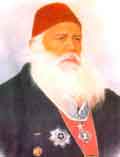18 Oct 2010, NewAgeIslam.Com
Sir Syed Ahmed Khan: A lost legacy
 October 17 is celebrated as the great educationist and reformer Sir Syed Ahmed Khan’s (1817-1898) birthday.
October 17 is celebrated as the great educationist and reformer Sir Syed Ahmed Khan’s (1817-1898) birthday.
Some of the products of the Aligarh movement misunderstood Sir Syed's message. Unlike Sir Syed, they used rhetoric instead of rationalism when they addressed the community. The Ali brothers (Maulana Mohammed Ali and Shaukat Ali) belonged to this group of leaders who set a bad trend. Emulating the Ali brothers, the myopic Muslim leadership of today exploits the community's fear and keeps it riveted to emotional issues. A few voices who could have been exemplars are largely isolated. Maulana Wahiduddin Khan is one of them. Khan's views, though essentially inspired from the Quran and the Hadith, are not accepted by the majority of Muslims. His much-publicised recent advice to the Muslims to relocate the Babri Mosque drew ridicule from most ulema. "He is working for the RSS and doesn't represent us. We have rejected his proposals in the past and reject this one too," declares Maulana Mehmood Daryabadi of All India Ulema Council. -- Mohammed Wajihuddin
Sir Syed Ahmed Khan: A lost legacy
By Mohammed Wajihuddin
Oct 17, 2010
In 1869, while preparing a rebuttal to William Mayure's blasphemous book The Life of Mohammad, Sir Syed Ahmed Khan (1817-1898), communicated from England to a friend in India: "William Mayure's book has deeply disturbed me. His bias and injustices have singed my heart. But I have resolved to rebut it and I don't care if I am broke and become a beggar in the process."
As the ardent admirers of Sir Syed, founder of MAO College which later became Aligarh Muslim University, celebrate the reformer-educationist's birthday on October 17, many will recall Khutbaat-e-Ahmadia, Sir Syed's labour of love which tore through Mayure's malice against the Prophet. Instead of baying for Mayure's blood, as most contemporary Muslims would do if someone were to pen such a book today (ask Salman Rushdie), Sir Syed responded rationally and pragmatically to the provocation.
As AMU's alumni brace up to commemorate the grand old man of Aligarh, there's a question worth asking: why and how did the reformist movement that Sir Syed launched decades ago lose its steam so completely? More pertinently, why don't Indian Muslims have too many secular icons like Sir Syed today?
Akhtarul Wasey, a former student leader at AMU and currently professor of Islamic Studies at Jamia Millia Islamia, sees several factors as responsible, including Partition which deprived Indian Muslims of an enlightened leadership, and the post-Partition riots which stunted the growth of a secular spirit among the community. "A series of communal riots pushed Muslims towards religious leadership which is conservative and abhors the ideal of secularism," says Wasey.
Sir Syed found great strength in his colleagues and the college he founded, which worked as agents of change. This engine hit roadblocks once the generation he had personally guided vanished from the scene and the college went into other hands. "Till MAO College became AMU in 1920, many immediate inheritors of Sir Syed's legacy were around and diligently carried forward his mission. Gradually selfishness crept in and insincere followers of Sir Syed started chipping away at his values," analyses Asghar Abbas, former director of the Aligarh-based Sir Syed Academy. Abbas cites the loss of AMU's stature as a great seat of learning as one of the reasons for the severe drought of secular, enlightened icons among contemporary Indian Muslims. Some policies on the part of AMU further helped this downfall.
"Once it allowed madrasa graduates into higher courses in AMU, the university lost its culture of excellence, its intellectual edge. AMU was not created to produce or train maulvis. It was created to produce individuals who would challenge the orthodoxy," Abbas continues. Forget about challenging the orthodoxy in the community, today's AMU, regrets Abbas, is being swamped with the same status-quoist , orthodox elements.
Saiyid Hamid, ex-bureaucrat and a former VC of AMU, sees it differently. He says Sir Syed was fortunate to have rational colleagues like Shibli Noamani and Altaf Hussain Hali around him. They influenced the Muslim masses through their speeches and writings. AMU, which had led from the front for introspection among Muslims, lost to Jamia Millia Islamia, created much later.
"The centre of gravity for intellectual leadership among Indian Muslims shifted to Jamia Millia Islamia. It once housed three great secular scholars, Dr Zakir Hussain, Prof Mujeeb and Abid Hussain. After them, there is nobody in Jamia worth mentioning," says Hamid. Much of today's Jamia's energy, which could have been used to create secular, rational icons and leaders, gets wasted in staging protests.
Some of the products of the Aligarh movement misunderstood Sir Syed's message. Unlike Sir Syed, they used rhetoric instead of rationalism when they addressed the community. The Ali brothers (Maulana Mohammed Ali and Shaukat Ali) belonged to this group of leaders who set a bad trend. Emulating the Ali brothers, the myopic Muslim leadership of today exploits the community's fear and keeps it riveted to emotional issues.
A few voices who could have been exemplars are largely isolated. Maulana Wahiduddin Khan is one of them. Khan's views, though essentially inspired from the Quran and the Hadith, are not accepted by the majority of Muslims. His much-publicised recent advice to the Muslims to relocate the Babri Mosque drew ridicule from most ulema. "He is working for the RSS and doesn't represent us. We have rejected his proposals in the past and reject this one too," declares Maulana Mehmood Daryabadi of All India Ulema Council.
Indian Muslims must produce and nurture more secular, enlightened leaders. Sir Syed's birth anniversary is a good occasion to start.
Source: The Times of India
URL: http://newageislam.com/NewAgeIslamIslamicPersonalities_1.aspx?ArticleID=3542




 Moderate Islamist here
Moderate Islamist here


0 comments:
Post a Comment